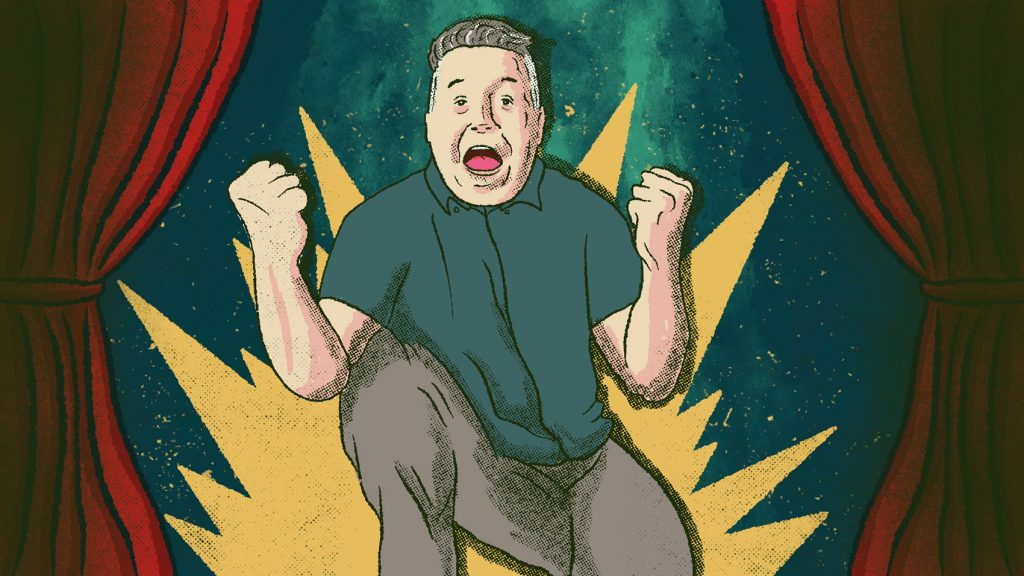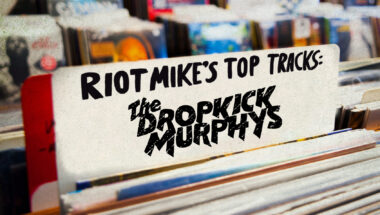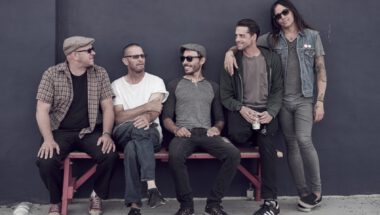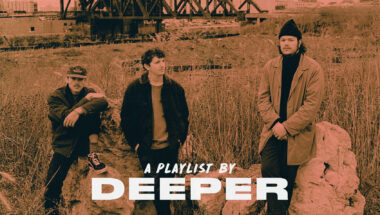For the past two years, Boston punks Dropkick Murphys have held a virtual St. Patrick’s Day concert in lieu of their annual St. Paddy’s tour. Their livestream shows have amassed millions of views and won several awards, including the #3 spot on Pollstar’s “Top 2020 Livestreams” chart.
But—despite the online success—vocalist and former bassist Ken Casey says not playing to a room full of fans has been draining. “The crowd in the room just gives you the life, it’s the lifeblood of live music,” said Casey.
This year, the band is back on the road for the first time since 2020 in support of their latest record, Turn Up That Dial. And, even though their usual St. Patrick’s Day performance will be livestreamed again this year, the band will be playing the show in front of a live audience.
Before Dropkick Murphys hit the stage at Radius on Saturday, February 26, Riot Fest talked to Casey about the band’s turbulent lineup changes; staying rooted in punk ethos by giving back to their community; and the measures any modern rock ‘n’ roll band must take to make it during a global pandemic.
Dropkick Murphys has implemented quite a few lineup variations over the past few years, including your switch from bass to lead vocals. How does the band transition through these changes?
Two things happened when I stopped playing bass and just started singing. The first was that I had neck surgery and I lost all feeling in my right hand. I was supposed to be off the road for three months recovering, but five days after the operation, I went on tour. Obviously, I couldn’t play, so I just started singing.
At the same time, Al’s father had unfortunately just passed. Al wasn’t really up for putting the face on, so to speak—he was really struggling and we all understood. Having the two of us up there together, we were able to play off each other, I was trying to lift his spirits. I’ve always been the guy that connects with the crowd, so it was not completely unnatural for me. I loved connecting with the audience and creating that bridge between me and Al.
After I got better and Al had grieved, everyone in the band said, “We think it’s more fun this way.” We’re not the type of band that looks off over the crowds—we want to make eye contact and connect with the crowd. If it’s a big stage—like when we play the bigger festivals in Europe, and there’s X amount of people on one side, and X amount on the other—we can be connecting with more people, so we decided to stay [with two lead vocalists]. Our good friend, Kevin, has worked for us for years and filled in on just about every position, so it was nice to reward him with a permanent gig.
When Al’s dad passed, there was really no one to look after his mom. Al felt he needed to step up because his only other sibling, his sister, and his wife, had taken the responsibility when Al’s father had a prolonged illness. So Al felt it was the right thing to do to not put that burden on them again. We all respected that, and I would go so far as to say I actually wouldn’t have wanted him to not do it; it’s just the right thing to do. We’ve always been the kind of band that puts family first and you’ve got to practice what you preach.
Obviously, Al will be missed, but I’ve missed shows—everyone’s missed shows! This is short-term. In keeping everyone humble in the band, I’ve always said, “Don’t get a big head, because the band is bigger than any one individual.” It can and will continue as long as there’s guys playing these songs and bringing the energy. There’s been nothing but support from the fans.
Most people need to call in sick to work every once in a while. You don’t exactly have that luxury on the road.
I won’t name names, but one of our members may or may not have gone to see KISS on a day off and had a little bit too much to drink. The next day he said, “Hey, can you tell me the policy on calling in sick?” I said, “The policy is unless you’re dead, you’re on the stage.”
We’ve all been in the bunk with the flu. One time in Europe I had the flu, and I would be in my bunk sleeping, get woken up 10 minutes before the show, go play the show, then come back in the same sweaty stage clothes and crawl into the bunk and go back to sleep. It was disgusting, but I didn’t even have the energy to change, I was so sick. But there’s something about the adrenaline of being on stage, it almost cures you for the 90 minutes I was up there. It’s a bizarre phenomenon. I’ve felt like I literally couldn’t walk before, but then you see that crowd and you hear 120-decibel guitars, and all of a sudden, you’re awake and ready to go.
While Al is gone, you’ll be joined on stage by a few of the vocalists from the other bands on tour. What has it been like teaching other bands part of your set?
I can and will do most of the vocals, but we’re going to have the other vocalists guest on a few songs. Just because we’re still in the COVID era, a bunch of them are learning our set. Now, our drum tech could fill in on drums, and with Al not there this tour, we’re preparing for if I get COVID and couldn’t play. For a band to be out on the road and have to cancel a show and not get paid, but still have to pay all your daily expenses, it would be really devastating. As a backup plan, everyone learned some of our songs because if one of the other bands gets sick, we could still pay them. But if Dropkicks can’t play, then the promoter’s not gonna pay anybody, so we’re hedging our bets with this backup plan. We felt that if everyone’s learning a bunch of songs, we might as well have a good vibe and have a party atmosphere with a bunch of people joining in on stage.
This is surprisingly the first time I’ve heard of a band having backups learn their set in case they need a fill in. Has this become the new normal for touring bands?
I know Flogging Molly had a couple of guys get [COVID-19] on tour in the fall. They had to play minus a few guys, and I think people understood. On our tour in September, our sound man got COVID and he slept in the bunk above me, but we’re all vaccinated and no one else got it. I look at it as if you just want to prepare and hope you never have to deal with it instead of being like, “Oh, shit, can somebody learn 25 songs on a few hours notice?” It’s a real concern nowadays. I’ve heard some pretty disastrous stories of bands having to cancel and shut down and having to quarantine in a hotel. We’ve said this before, but hopefully we are on the way out now.
During the shutdown, you played a series of successful livestreams shows, notably swapping out your traditional St. Patrick’s Day tour dates with livestream performances. How did you approach each of those virtual shows?
The first one was so intense because it was literally four days after everything got shut down. It was the most intense rush of throwing something together. We were just so ecstatic it actually worked, and then right when we were supposed to be going live, the Internet was crashing. We were just so happy it worked, and when we saw how many people viewed it, we almost shit ourselves. If you want to get a ton of views for your livestream, my advice is to do it while there’s a global pandemic and everything is completely shut down. I had old people at the supermarket say, “Hey, I watched your livestream!” It was the only thing on.
Days after everything shut down, you were seeing the biggest names in music having to play an acoustic on their couch at home, and that made me feel bummed, like, “Oh, man, I don’t even want to see this.” I saw one with Elton John playing piano in his driveway and there was a basketball hoop behind him.
Going into the second livestream, we were thinking of how to take that experience and make it different. We used Fenway Park for the second one and used drones. Having no audience obviously sucked, but to do it on the infield at Fenway Park was a pretty special experience. At the time, Fenway and the city [of Boston] would only allow 35 bodies in the entire park. Ten of those were security from Fenway, so that left us with 25. We have eight band members, so that left 17 bodies to do the whole show, including our techs and cameramen. Those guys should have won some kind of award for pulling that off.
The last two livestreams we did back-to-back in a sound studio, but we surrounded ourselves in a video wall and did it facing each other, so at least we can play off each other’s energy. With the first one, we were just thrilled to be able to do it it, and with the other three, I felt like we got unique about how we did it. I was thrilled with how they came out, but not playing to humans just sucks, you know? By the last one, our numbers had gone way down to people. I think people felt that, “Yeah, that was cool in a pinch, but we want contact, too.” We’re actually streaming this year on St. Patrick’s Day, but in front of a live audience, which will be cool, because people can watch the energy and interaction.
Focusing on your latest record, Turn Up The Dial, you said “the overall theme is the importance of music, and the bands that made us who we are.” Who are those bands and how did they inspire you?
Everything from late 70s British punk rock like The Clash, to Stiff Little Fingers from Belfast, to the first wave of British Oi! The Business took us on our first tour, and Cock Sparrer predates all those bands, actually. Of course, The Pogues were the end all, be all for kids who grew up as punk rock fans in Boston, who had legit Irish community and Irish families, we knew all those [traditional Irish] songs and when The Pogues came along it was like they made our grandparents’ music for us—it was like speaking to us. I always make the comparison that the Pogues are a traditional band with a punk rock attitude and influence, and we’re more of a punk rock band with traditional influence.
My early live music exposures were really more Boston hardcore, because obviously The Pogues and UK punk bands weren’t playing Boston every night, but local hardcore bands like Gang Green and DYS were so prominent. As it got a little later, you had Slapshot and the [Might Mighty] BossToneS starting— early Bosstones were crazy shows. That was the music around me in my teens through early-20s, and Dropkick started a few years after that.
I’ve seen a lot of older punk bands stray from their punk roots as musicians who care about their communities, but that’s never seemed to be the case with Dropkicks. How do you stay rooted in your founding ethos?
We’re a different breed in that we really feel like we owe so much to Boston that we always have to get back. The band started on a bet. I was working in the laborers’ union and bartending at night, and a kid that I bartended with dared me to open for his band on three weeks notice; I’d never played music, just put a band together just for a laugh so we had very low expectations. But we started to take ourselves slightly more seriously and play real shows at the Rathskeller—the Rat, we called it—which is Boston’s version of CBGBs. In the mid 90s, the all ages matinee punk crowd was just so massive—we were already selling that place out when we had just released a couple of seven inch singles. You had bands like Dropkick Murphys, The Ducky Boys, The Unseen, Showcase Showdown, the Trouble, all packing the Rat.
All these other bands from out of town wanted to play the Rat, so we’d book a show that we would headline and pack the place with seven bands from seven other cities. They’d come here and play an insane show to a full crowd and we’d give them all the money and they’d go back to their cities and owe us a show there. There was some of that pride in your town where those other bands would say “We just played Boston and the show was insane! When Dropkick Murphys come here, we’ve got to fill this place, even if we’re dragging out our grandparents!” That’s how we got our touring start, so we always felt like we owed so much to Boston, and that’s why we got involved in charitable things right out of the rift. It felt good, because we’re all blue collar guys that stumbled into music, so there was always almost a guilt to it, like this doesn’t seem like a worthy lifestyle. Whether it’s social politics, local labor, or just straight up charity work, we’ve been involved from the beginning. It keeps us grounded and seems a lot more important than music.
I’d love to hear more about your involvement in labor unions and charity work in Boston.
From the start, that’s been what we were passionate about and what we knew in life—from growing up in the Reagan era and seeing the shift in union struggle to when the band started and I was a laborer. My grandfather was, too, and father-in-law was, it was all around me. We started out writing about these things that were important, and then as we got popular people like AFL-CIO would reach out and say, “Hey, do you want to come down and play acoustic?” We’d come through and get on picket lines.
On this current tour, in Ohio, I got asked to show up at a Starbucks that’s trying to organize. I just read about Starbucks’ profits, and it’s insane: the CEO is making 20 million a year and their profit is 8 billion dollars, and they won’t even let their employees unionize. It’s something that’s important to us, and that’s where you get to put your money where your mouth is. If you’re gonna write songs about it, you’ve got to show up when you need to. We also get the same love and support back from unions. We’ll come through some cities, and there will be a local that will buy 200 tickets for their members.
To wrap things up: what’s it going to feel like to hit the road again and get back to connecting with your fans?
The crowd in the room just gives you life, it’s the lifeblood of live music. I’ve always said if there’s any musician that thinks they’re more important than the audience, take the audience away and let’s see how you feel then. I don’t know if any musician would really ever take their audience for granted, but if they did, this [pandemic] would have been a real eye opener. We’d miss everybody. Over the course of 26 years, I’ve probably shook hands with 50 percent of our fans, and definitely all of them that are upfront. You see these familiar faces at the shows, and even if I don’t get to shake their hand, but I can give them a nod and a smile, it’s so cool.
You can catch Dropkick Murphys, The Rumjacks, The Bombpops, and Jesse Ahern on Saturday, February 26, at Radius. 640 W. Cermak Rd. All Ages, 6:00 p.m.; get your tickets here.



